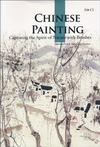中国绘画
出版时间:2010-1 出版社:五洲传播出版社 作者:林茨 页数:181
前言
Yellow River is the cradle of Chinese Civilizations. Onthe fertile lands along this mother River, tribes settled,clans formed, civilization developed and art emerged.Chinese painting can be dated back to prehistoric times and theearliest paintings of art were found on pottery pieces unearthedfrom several early civilizations in the Yellow River Valley. Forexample, Yangshao Civilization around 5000-3000 BC was a greatand influencial society with its geographic area reaching todaysHubei Province to the south and Mongolia to the north and was acivilization in a transition period from matriarchal to patriarchalsociety. Cultivation and agriculture were already extensively usedby this civilization. Fine pottery pieces unearthed demonstrated aunique characteristic of their own. The colorful pottery of MajiayaoCivilization of early Neolithic time in the upper region of theRiver around 3000-2000 BC was considered to be the finest in thatperiod and had achieved unprecedented level of sophistication.
内容概要
Traditional Chinese painting was fundamentally an abstract art form.Although there were no absolute abstract Chinese paintings in its original meaning, objects in a painting were not a direct copy of the nature world following the principle of perspective. It was rather a combination or harmony between the nature world and human emotion, a product of "heaven (nature) and human". The effect Chinese painters would like to illustrate in their paintings was not a visual effect of colors and patterns as their Western counterparts would like to achieve. The description of objects in their paintings was no means accurate and few concerned about such factors as colors, principle of perspective, anatomy, surface feel, and relative size. What they would like to achieve was a world in their mind of non materials. The nature world was not an object for them to make a true copy and it was rather elements for them to build their own world.
作者简介
Lin Ci (1958——2009), original name ZhangQian, graduated from the Zhejiang Academyof Art and China Art Research Institute, wherehe earned an M.A. degree. He was a researchfellow with China Art Research Institute,specializing in art history and visual arts.His major books include Accordion PleatedSkirts, Gospel Valley, and Mango Trees. Hismonograph Photography will soon be publishedby SDX Joint Publishing Company.
书籍目录
PrefaceFrom Gu Kaizhi to Wu Daozi Tomb Chamber Paintings The Most Romantic Painting Communicatin of the Soul Spring Outing Emperors of Great Prosperity Another Figure Painting The Painting Saga Famous Paintings Record of Past DynastiesDesert Treasures Buddhism Going East Dunhuang Mogao CavesLucid Mountains and Remote Streams Northenr Painters and Southen Painters Song Huizong and his period Along the River During the Qingming Festival(Qingming Shanghe Tu) Panorama Shanshui Su Shi andMi FuScholar Paintings Zhao Mengfu and "Four Masters of the Yuan Dynasty" Plum Blossom, Orchid, Bamboo and Stone "The Southern and Northern Sects" "Four Monks" and "Four Wangs" The End of Scholar Paintings and Famous Chinese Painters of Modern TimesModern Chinese Paintings Painters Studying Abroad Revolutionary Realism "Modern" and "Post-Modern"Appendix: Chronological Table of the Chinese Dynastie
章节摘录
The Northern Song Dynasty unified the country, endingthe turmoil caused by feudal states that tore the nation apartand ushering in a period of social stability. As commerce andthe handicraft industry underwent rapid development, urbancivilization flourished. Zhao Ji, the eighth emperor of the NorthernSong Dynasty otherwise known as Huizong, went down in historyfor his political incompetence and obsession with art. When theNorthern Song was overthrown by the Jin Dynasty of the northernnomads in 1127, emperor Huizong and his son Zhao Heng, oremperor Qinzong, were captured and jailed by the invaders anddied miserably years later. After the fall of the Northern SongDynasty, the imperial court retreated to the south where theyestablished the Southern Song Dynasty (1127-1279) with Linanas the capital city. Immigrants from the north exploited theresourceful south and together with the locals created a period ofsustained economic and cultural developments. Bianliang (Kaifeng,Henan province) and Linan (Hangzhou, Zhejiang province),respective capitals of the Northern Song Dynasty and theSouthern Song Dynasty, were both prosperous commercial cities.
图书封面
评论、评分、阅读与下载
用户评论 (总计2条)
- 很地道的中国绘画英文手册。
- 书印的很好,价格有些高!能接受。但在运送中折损严重,心痛啊!!!爱书人很难接受心爱的新书受到污染折损的!!!!!
